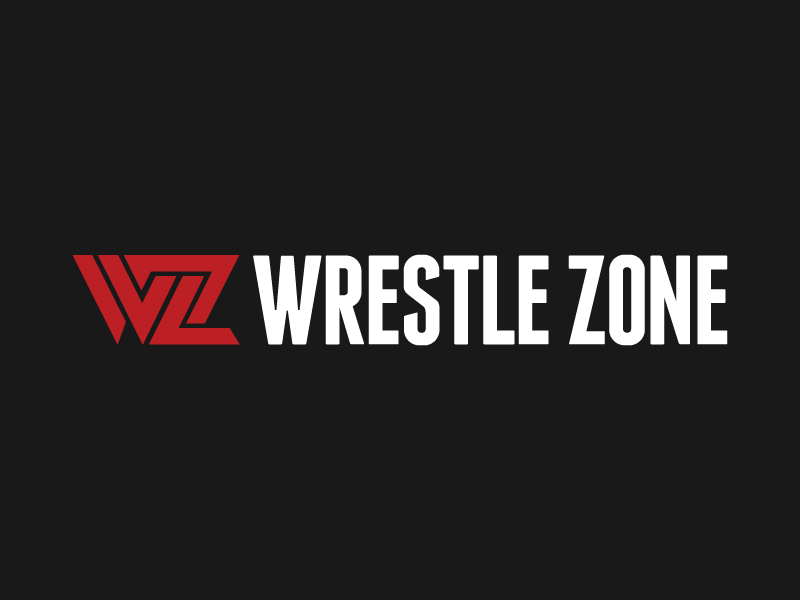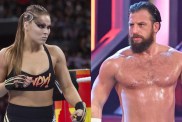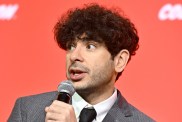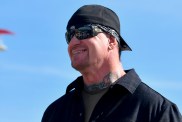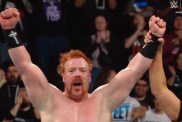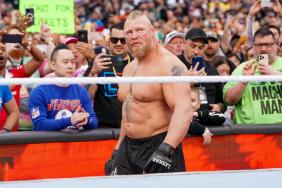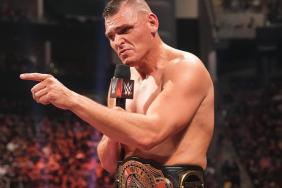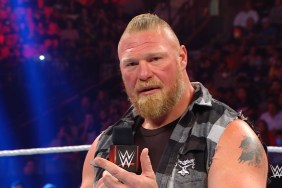Kevin Sornatale from Spike TV sent along the following …
Salil Gulati: Hey, everyone, thanks for joining us today. We are having our ultimate fighter team Lesner versus Dos Santos conference call. The season premieres tomorrow night on Spike at 9:00 pm and with us today we’ve got the two coaches, Mr. Brock Lesnar and Mr. Junior Dos Santos is with his translator to answer your questions. I’m going to turn it back over to the operator now. We’re expecting a large turn out today, so if you can limit your questions to once per turn, that would be appreciated.
Operator: If you would like to ask a question, please press star then the number one on your telephone keypad. Again, that’s star then the number one on your telephone keypad for questions. Your first question comes from the line of (Neil Davidson).
(Neil Davidson): Yes, thank you. Brock my question is for you, you’ve been in the public spotlight throughout your career but you’ve also indicated you don’t really like – you like having your privacy. What was it like spending the six weeks with the cameras on you while you were serving as coach?
Brock Lesnar: I don’t know you just kind of get used to it and – I was there to do a job and my job was to be the coach for the ultimate fighter, and I got a job to do June 11 and that’s to fight Junior Dos Santos. I’ve been in front of the cameras a lot in my career so I just approach it as any other thing – as professionally as I could.
(Neil Davidson): Did you enjoy it?
Brock Lesnar: I did enjoy the show, I did, yes.
(Neil Davidson): OK, thank you.
Operator: Your next question comes from the line of (Matt Manzella).
(Matt Manzella): Good afternoon, guys. This question’s for Brock. Brock, you were a little bit reluctant in the early stages as far as coaching, now that all is said and done I mean is it something you would do again in the future?
Brock Lesnar: I don’t – I wouldn’t – I don’t know if I would or not. Looking back from the beginning of the show, you know I was very hesitant just because – you know I did not want to get out of my comfort zone too much, but we had a great group of guys, it was a great opportunity for me to learn as well and I probably wouldn’t do it again, no. But I did enjoy it.
(Matt Manzella): Thanks a lot, Brock. I appreciate it.
Operator: Again, if you would like to ask a question, please press star then the number one on y our telephone keypad. That’s star then the number one on your telephone keypad for questions.
You have a follow up question from the line of (Neil Davidson).
(Neil Davidson): Yes, my question is for Junior Dos Santos this time. Could he give us his thoughts about what it was like being a coach on the show? And also, can he give us a hint of how he got on with Brock, his rival coach?
Junior Dos Santos: (Translated) He said being in front of the cameras for that long and being in the house and the show was a new experience for him, he really enjoyed it and being on the show with Brock was great because Brock is so used to the media spotlight and being in front of the cameras and he’s such a – he’s a professional guy, a serious guy so it was a great experience for him, and he feels that both guys really did their best in the show.
(Neil Davidson): And can you ask him about what the thought about the level of talent that was on the two teams? How good the fighters were, was he surprised by how good they were? Hello?
Male: Who was that question for?
(Neil Davidson): That was for Junior.
Male: Junior, you there?
Operator: His line disconnected.
(Neil Davidson): Brock, can I ask you that question then? Did you – the talent that you had at your disposal coaching, you said it was a great bunch of guys, were you surprised at their level or was it what you expected?
Brock Lesnar: There was – there was guys there that had – I mean there was great talent and then there was not so great talent, you know? And it becomes very evident in the show, you know? So the cream rises to the top and the guys that are supposed to win-win and you know it’s pretty well – it was pretty well etched in stone.
(Neil Davidson): And if I could follow up with you, how would you describe your relationship with …
Male: (Inaudible – foreign language).
Male: (Inaudible – foreign language).
Male: (Inaudible – foreign language).
Operator: Mr. Junior Dos Santos has rejoined the conference.
Male: (Neil), do you want to reask that question to Junior.
(Neil Davidson): Sure. If you could ask Junior what did he think of the talent of the fighters that were on the show? Was he surprised by how good they were? How would he rate them?
Junior Dos Santos: (Translated). He said it was a great experience working with all of the guys, you know they all had a already pro MMA fight so none of them were – you know debaters, they all knew what they were doing, so it was good to just be able to pass on the experience and be able to work with them every day.
(Neil Davidson): Thank you.
Operator: You have a question from the line of (Elliot O’Hensky).
(Elliot O’Hensky): Yes, hi. Good afternoon everyone. First, for Brock, want to ask when you were going into coaching these guys, did you have any influences in terms of who you – how you wanted to be as a coach, maybe (Jay Robinson) at Minnesota or any other coaches that you had along the line who prepared you for the act of coaching?
Brock Lesnar: Well, I actually had one of my mentors with me, (Marty Morgan). You know I brought my own coaching staff there, (Marty Morgan), (Eric Paulson), (Greg Nelson), (Comprito), (Luke Richardson). So you know I had a pretty – I was surrounded with guys that have taken me to the top and hopefully I just wanted to – I really wanted everybody there to do well, you know and I tried to – I just tried to influence them in – you know it really is a short period of time that you’ve got these – you’ve got these guys – you’ve really got to manage your time well with them, I mean five and a half weeks is a short period of time and there’s a lot of fighting going on in that period. So if these guys bring bad habits to the table or they lack experience in one area, it’s pretty hard to – you know you’ve got to be pretty creative and to figure that out really fast.
(Elliot O’Hensky): And then you do have an ultimate fighter alum in your camp in (John Madsen). Is there anything that you ask him about the show before you went on it to learn about anything from perspective of one of the fighters who goes on the show?
Brock Lesnar: I did not, no, I didn’t. I wanted it to be a refreshing experience. I didn’t want to come in there with – you know knowing anything about anything, so I was just – I just try to keep it as much reality as I could.
(Elliot O’Hensky): Thanks. And for Junior, did you – did you look for any guidance from (Impost Unatower) and (Nogarus) before you went on the show – having him – with him having coached a season in the past?
Junior Dos Santos: (Translated) He said that as soon as he heard that he was going to be couching (Tough), he called (Nogara) and (Nogara) you know gave him a few pointers of what you know he should expect and how to act and he said just to act like himself. He said the first week will be the most difficult and then he’s just get the hang of it and Junior felt that’s exactly what happened.
(Elliot O’Hensky): (Inaudible) my questions. Thank you so much.
Operator: Your next question comes from the line of (Damon Martin).
(Damon Martin): Hi, first question is for Brock. A lot of times during the ultimate fighter we see the coaches kind of gain motivation for their fight just because you spend so much time around each other, it’s almost like you’re trapped together. Did you have any of that with Junior or did you guys get a long pretty well or what was your time with him like on the show?
Brock Lesnar: I don’t know what them guys are referring to. I probably spent a total of 30 minutes with Junior on the show, you know? I didn’t make it a point to run into him or anything in that nature. I don’t know – I don’t know. I saw very little of him other than what we were doing you know for television. But the total time that I spent with Junior there in total time was 30 to 45 minutes total that I saw of him.
(Damon Martin): OK, awesome. Thanks a lot Brock.
Operator: Your next question comes from (Neil Davidson).
(Neil Davidson): Brock, you heard what Junior said about the advice that (Nogara) said about being yourself, I’m sure you were yourself on the show. Do you think that viewers will see a different side of Brock Lesner than perhaps they would normally see in prefight build ups?
Brock Lesnar: Well now you’re just going to have to wait until tomorrow night, I guess – or Wednesday night.
(Neil Davidson): OK, fair enough.
Operator: Your next question comes from (Adam Hill).
(Adam Hill): For Brock, you were able to you know obviously spend that five and a half weeks here in Las Vegas and not all the time was filming the show, can you talk about your experience here in the city?
Brock Lesnar: About 10 hours of the day was to and from the show. I got my own workouts in every morning, but I was able to get out and enjoy some of the city. I went to a few shows and enjoyed going out to visit the damn and Red Rock and took in a NASCAR race, so yes, all in all it was a good time. My family enjoyed it out there, but as far as time on the strip, I didn’t spend a whole lot. I went to Garth Brooks and George Strait, Reba McIntire – I went to George, yes. So it was a good time.
(Adam Hill): Cool, thanks very much.
Operator: If you would like to ask a question, please press star then the number one on your telephone keypad. That’s star then the number one on your telephone keypad for questions.
You have a question from the line of (Sergio Nunn).
(Sergio Nunn): Yes, I have a question for Brock. You had mentioned that you looked at this as a learning experience, what did you learn on the show?
Brock Lesnar: Well, not just from the show, but just being a coach, learning and teaching thee fighters. As a teacher you have to really break things down so that the student can understand it and I had to refer to – you know it allowed – I wasn’t under the gun on anything, you know like I wasn’t in the training camp so I was able to absorb things from my coaching staff and just learn you know different technique in different areas, and so with no pressure involved in it. So that’s what I meant by that.
(Sergio Nunn): Did you learn anything from cornering the fighters during their fights themselves?
Brock Lesnar: I mean yes, there’s things that you pay – and I’d never cornered – I cornered a couple times before that really you know you understand – I think the biggest thing that I took away from it was octagon awareness and stuff like that.
(Sergio Nunn): Do you see yourself doing coaching down the line or is this it for you? Not just on (Tough) but just coaching in general.
Brock Lesnar: You know I haven’t thought that far down the road, you know I’m – I try to – in our – in my environment and our training camps, we help one another so we kind of – we all kind of pitch in to correct one another and so I meant here is a bit of coaching involved as you’re training, but right now I’m just focused on fighting.
(Sergio Nunn): OK, thank you.
Brock Lesnar: Thank you.
Operator: You have a follow up question from the line of (Elliot O’Hensky).
(Elliot O’Hensky): Hello again, guys. Brock, your campus usually been you know built around you and really only had other heavy weights in there with (their) – any adjustment you had to go through to working with welter weights?
Brock Lesnar: I mean fighting is fighting. So I mean these lighter guys, I was able to – you know they move a lot faster and – but still the basic fundamentals to fighting is pretty much the same, so I was able to understand that there was with a lack of – I mean some guys came into the show with different areas that they were stronger in and I was able – able to give them some more wrestling, you know if that’s the case.
(Elliot O’Hensky): And to what degree of being – certainly relative to the – to a lot of the other fighters who have coached the show, relatively new to the sport, albeit very, very successful, what degree did the fighters that you were working with remind you at all of yourself when you first made the transition into MMA?
Brock Lesnar: I guess my biggest surprise you know is the guys that – like how strong wrestling is in the sport. I mean you got to be – I mean take (John Jones) for instance you know to be able to take a fight wherever you want to is very powerful in this sport, you know and so I just look across the board and I see the wrestler starting to take this sport to another level.
(Elliot O’Hensky): Those are my questions, thanks so much.
Brock Lesnar: Thank you.
Operator: Your next question comes from (Frank Curary).
(Frank Curary): First question is for Brock. Brock, you mention that this took you out of your comfort zone initially, what are some of the sacrifices that you made other than family back home? Things that you missed out on in order to do – to do the show.
Brock Lesnar: I didn’t miss out on anything, I had – my family was with me so it was a nice vacation for my family …
(Frank Curary): You didn’t miss any hunting or anything like that.
Brock Lesnar: The cold – no, I pretty much had it all. I mean if it would have been any other time of year for me, I probably wouldn’t have – other than – I mean financially making this right for me to do with Mr. (White) and everything it was just – I was just – everything was – it was set up perfectly for us. I got to thank my management and Mr. (White) and Spike TV for making me very comfortable in Las Vegas.
(Frank Curary): Now, you had the experience, you know the – with the diverticulitis and everything and the surgery, it seems – I hope you don’t take this the wrong way, Brock, but it seems like you’re a more grounded and humbled Brock, does any part of that experience carry over to this and make it easier to do the show and everything or is it just the concessions that Spike and the USG made?
Brock Lesnar: Well, I mean I don’t know, I try to grasp it a little more and appreciate my career a lo t more than I probably did before the sickness and – but I still’ve got – you know I’m angry – I’m angry that I lost last fall but being angry about it isn’t the solution but being – but doing something about it, you know and that’s what I intend to do, is to get another- to get a title shot.
(Frank Curary): Thank you, Brock. The next questions for Junior, Junior, can you talk about – this is obviously – you know Brock is already a very big star in the sport and in the sports world. Junior is a phenomenal fighter, but really doesn’t have you know the attention probably that he deserves. Talk about I guess what being on the show means to him as far as his career and the – you know probably the explosion of exposure he stands to get.
Junior Dos Santos: (Translated) He said you know he was very upset when he found out that (Cames Alaskas) was injured and he wouldn’t be able to fight him for the title, but at the same time he got very happy when he heard the news he’d be coaching alongside Brock on (Tough) and you know he said a Brock is a guy that’s bringing a lot of fans into MMA, he’s a guy that’s very well known in the U.S. and Junior’s a guy who’s starting to come up right now and this is a great opportunity for all of his fans to be able to see him.
(Frank Curary): Thank you both, gentlemen.
Operator: Your next question is from (Neil Davidson).
(Neil Davidson): I wondered if seeing these young hungry fighters, whether it brought you back to early in your career. Obviously, you took a different path to mixed martial arts, but perhaps earlier on in your wrestling career. Was there the kind of – did that kind of hunger rub off a little bit, if you know what I’m saying?
Brock Lesnar: Some of these guys were the same age as me. No, I’m just kidding. And not – I wasn’t too much older than some of these guys. So they’re just at a different level of I guess – you know I explained you know these guys are one in a million guys that wanted to make it to the next level and they got an opportunity just as I got an opportunity from (Dana) to be a fighter. So they have to fight for it and earn it because they are not a household name and so there was – to relate – relativity I guess I can’t really – I don’t find any in it, you know but there’s one thing in common in all fighters and they want to be the best that they can be and excel in what they do so I can relate to them in that respect.
(Neil Davidson): And you said looking back at October, you were angry that you lost and that’s certainly understandable. I wonder, have you kind of been able to process why that happened and also were you healthy going into that fight?
Brock Lesnar: I was healthy physically, but mentally probably not so. I mean – I don’t think it really registers to the general public on my year last year, you know from being sick and losing 42 pounds and making – just to get my ass to the gym to recover and put that weight back on and they have a title fight and on top of that while I’m training for a new title fight, a new baby boy and then fighting (Shane Carwin) and then I was expecting some time off because I really needed it mentally more than anything, and physically, and then I booked a fight against (Cain) and so you know if there was one thing I could learn from that is maybe to spread title fights out a little farther than what I did, but you know I took a good loss from (Cain) and evaluating the film mean and (Cain) traded punches back and forth and he was uncomfortable on his feet enough to take me down and then from there I escape and I take a shot to the chin and I don’t recover from it. So in this game it’s a matter of inches and you know he was victorious that night. Next time, will it be different? I would hope so. But I got to get through Junior and plan on doing that in June.
(Neil Davidson): And that timing is good for you? The June?
Brock Lesnar: Absolutely, yes, I feel great.
(Neil Davidson): OK, thank you.
Operator: If you would like to ask a question, please press star then the number one on your telephone keypad. That’s star then the number one on your telephone keypad for questions.
There are no further questions at this time – I’m sorry, we have a question from (Frank Curary).
(Frank Curary): Yes, I have one more question, this is for Junior. He had mentioned you know that he found Brock to be very professional and serious. I’m wondering if that maybe exceeded his expectation? In other words, did he expect something all together different? I know that their experiences and their interaction were brief, 30 to 45 minutes, but did Brock sort of exceed Junior’s expectations I guess in that department. Did he expect something different?
Junior Dos Santos: (Translated) He said prior to the show he’d never actually met Brock, so he was a little bit surprised of how professional and you know how easy to deal with Brock was, even though they weren’t able to be together all that much, but he said in the end it was great to be able to meet his next opponent and the experience overall was phenomenal.
(Frank Curary): Thank you all, thank you both gentlemen.
Operator: Your next question comes from (Damon Martin).
(Damon Martin): Quick question for Brock, you mentioned earlier of course you know the different things that led you to coaching on the ultimate fighter, but was knowing that you know beating Junior got you a title shot again? I mean was that the biggest motivating factor for the show?
Brock Lesnar: Absolutely, you know analyzing my loss against (Cain) from losing that fight – you know if I would have won that fight I’d be facing Junior and I’m right back into this same position, but absolutely it’s the closest thing to get me to a title fight and getting my UFC heavyweight title back, for sure.
(Damon Martin): And you mentioned of course the timing of the (Cain) fight, maybe wasn’t as well, now that you’ve had this time off and you know coaching on the show and the fights you know in June, at this point is there a hunger or just a different feeling now that you’re getting ready to fight again?
Brock Lesnar: Yes, you know – I mean I just – I experienced a lot last year you know and so from a fighting standpoint it probably wasn’t a great timing, but you know it is what it is. You know? but from the business side of things when me and my team sat down and to except the fight, to understand that you know there was a lot of business – business things that we discussed, on the – positives versus the negatives and the positives outweighed the negatives by fighting in October. So at the end of the day this is prize fighting and I answered the call, you know but I fell short, you know?
(Damon Martin): Thanks a lot, Brock.
Brock Lesnar: Thanks.
Operator: If you would like to ask a question, simply press star then the number one on your telephone keypad. You have a question from the line of (Steven Merato).
(Steven Merato): Hey Brock, did you ever surprise yourself in terms of you know getting emotionally invested with your team?
Brock Lesnar: Yes, you know – being around a – when you’re forced to be around people you know you – I wanted the best for the guys, all of them, you know. So it was – I just found myself getting invested for them guys to win and be successful and it was – there’s a point in the show where you know we put a lot of time in with certain individual and there’s some success that builds into it and so it – yes, you get attached in some ways, yes. But, do I have anybody on speed dial, no.
(Steven Merato): Were you satisfied overall with your teams performance, you know without getting into specifics. Were you satisfied overall?
Brock Lesnar: You know I was, I was, I thought you know – I thought out guys did a tremendous job in believing in the system and it took some time, but they – I was happy. I mean it was a competitive show. The guys were – you know they were all there, I question – you know there was some question marks here and there, but at the end of the day you know the best fighters ended up you know winning and that’s – that’s just the way it is.
(Steven Merato): And (Derek) would you ask the same question of Junior? Did he find himself surprised at any time of you know in terms of getting emotionally invested in his team and the fights?
Junior Dos Santos: (Translated) Yes, he said that overall you know he was surprised with a few things that happened, you know his enthusiasm with the team and also the fact that his English was flowing so naturally he said he was able to speak English very well and understand what everybody was saying. So a lot of things on the show did surprise him.
(Steven Merato): How much has he been working on his English? Because I think some people have remarked about how quickly he picked up.
Junior Dos Santos: (Translated) He said actually right now he hasn’t been studying any English at all right now. He’s back in Brazil and focused on his training, but you know overall he picked it up from traveling so much in the U.S. and hanging around Americans all the time on his trips and just listening and doing his best to try to speak it.
(Steven Merato): Did his impression of Brock change or remain the same since the show?
Junior Dos Santos: (Translated) he said it’s hard to say you know what him impression was of Brock because he didn’t know him before, but after getting to know him on the show you know Brock is a professional guys, he’s actually a pretty nice guy, but you know Junior said on June 11 none of that really matters because his goal is to go in there and beat Brock.
(Steven Merato): OK, thank you guys.
Operator: If you would like to ask a question please press star then the number one on your telephone keypad. That’s star then the number one on your telephone keypad for questions.
There are no further questions at this time.
Male: All right, thanks everyone for joining us and look forward to the show premiering on Wednesday at 9:00. Thanks.
Operator: This does conclude today’s’ conference call, you may now disconnect.
